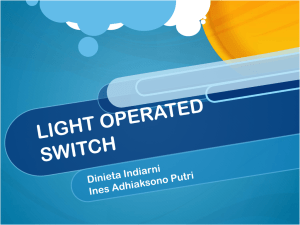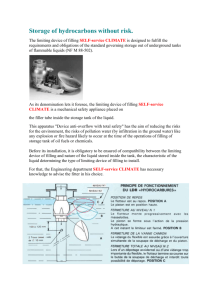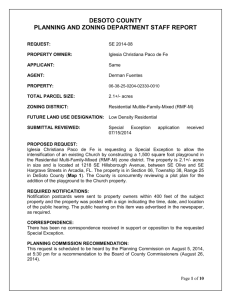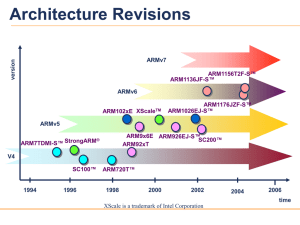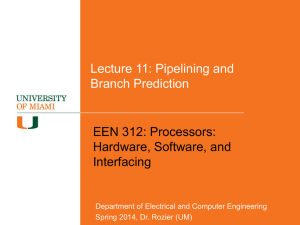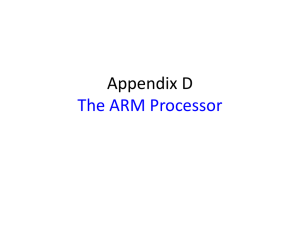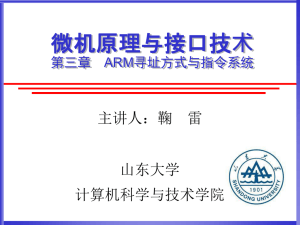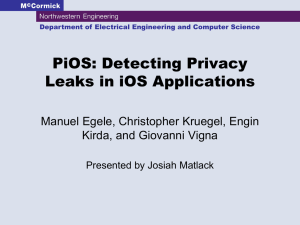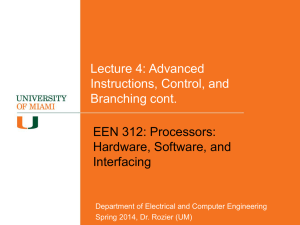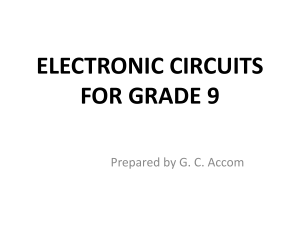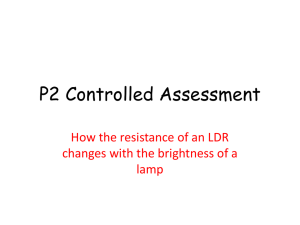ARM7 Architecture: ISA, Registers, Instructions, and Addressing
advertisement
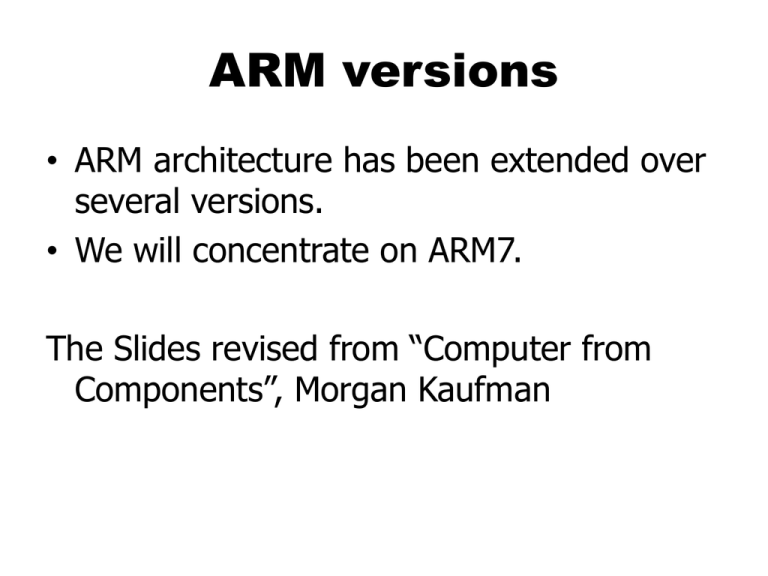
ARM versions
• ARM architecture has been extended over
several versions.
• We will concentrate on ARM7.
The Slides revised from “Computer from
Components”, Morgan Kaufman
ARM ISA
• All instructions are 32-bit long (not include
Thumb)
• Register and memory word are 32-bit
• Memory address is 32-bit
• Byte addressed
• Can be configured at power-up as either
little- or bit-endian mode
Note: There is a 64-bit ARM ISA
© 2000 Morgan
Kaufman
Overheads for Computers as
Components
ARM Registers
r0
r1
r2
r3
r4
r5
r6
r7
r8
r9
r10
r11
r12
r13 (SP)
r14 (LR)
r15 (PC)
0
31
CPSR
NZCV
CPSR: Current
Program Status Register
Status bits
• Every arithmetic, logical, or shifting
operation sets CPSR bits:
– N (negative), Z (zero), C (carry), V (overflow).
• Examples:
– -1 + 1 = 0: NZCV = 0110.
– 231-1+1 = -231: NZCV = 1001.
ARM data instructions
• Basic format:
ADD r0,r1,r2
– Computes r1+r2, stores in r0.
• Immediate operand:
ADD r0,r1,#2
– Computes r1+2, stores in r0.
ARM data instructions
• ADD, ADC : add (w.
carry)
• SUB, SBC : subtract
(w. carry)
• RSB, RSC : reverse
subtract (w. carry)
• MUL, MLA : multiply
(and accumulate)
© 2000 Morgan
Kaufman
• AND, ORR, EOR
• BIC : bit clear
• LSL, LSR : logical shift
left/right
• ASL, ASR : arithmetic
shift left/right
• ROR : rotate right
• RRX : rotate right
extended with C
Overheads for Computers as
Components
Load/store instructions
• LDR, LDRH, LDRB : load (half-word, byte)
• STR, STRH, STRB : store (half-word, byte)
Address modes
• Register indirect : LDR r0,[r1]
• With two registers : LDR r0,[r1,r2]
• With 2nd register negated:
LDR r0,[r1,-r2]
• With 2nd register shifted:
LDR r0,[r1,-r2,LSL#2]
• with a base register and 12-bit offset:
LDR r0,[r1,#4]
Address modes
• Register indirect : LDR r0,[r1]
• With two registers : LDR r0,[r1,r2]
• With 2nd register negated:
LDR r0,[r1,-r2]
• With 2nd register shifted:
LDR r0,[r1,-r2,LSL#2]
• with a base register and 12-bit offset:
LDR r0,[r1,#4]
LDR and STR as pseudoinstructions
• LDR and STR may also be pseudo-instructions
LDR r1, label
STD r1, label
• R15/PC is used as the based register, and label
is encode as its offset to PC
• They work if and only if label is within [-4095,
+4095] of PC
Array Access
• Assume X in r0, i in r1, a in r2, all int type
a = X[0];
LDR r2, [r1]
a = X[2];
LDR r2, [r1,#8]
a = X[i];
LDR r2, [r0,r1,LSL #2]
LSL: Logic shift left
Example: C assignments
• C:
c = a + b;
• Assembler:
LDR
LDR
ADD
STR
r0, a
r1, b
r3,r0,r1
r3, c
;
;
;
;
get value of a
get value of b
compute a+b
c = a+b
ARM Condition and Branch
• All instructions can be conditionally
executed, testing CPSR:
– EQ, NE, CS, CC, MI, PL, VS, VC, HI,
LS, GE, LT, GT, LE
– Example, execute if EQ: ADDEQ r1, r2, r3
• Branch operation:
B #100
– Can be performed conditionally
– Example: BEQ Branch if equal
– BEQ is the B instruction with condition code EQ
Example: if statement
if (a > b) { c = a; } else { c = b; }
; compute and test condition
LDR r0, a
; get value of a
LDR r1, b
; get value for b
CMP r0,r1
; compare a < b
BLE fblock
STR r0, c
B endif
else:
STR r1, c
endif:
; if a <= b, branch to else
; c = a
; c = b
Conditional Instruction
Implementation
if (a > b) { c = a; } else { c = b; }
; compute and test condition
LDR r0, a
; get value of a
LDR r1, b
; get value for b
CMP r0,r1
; compare a < b
STRGT r0, c
STRLE r1, c
; if GT, c = a
; if LE, c = b
ARM subroutine linkage
• Branch and link instruction:
BL foo
– Copies current PC to r14.
– Equivalent to MIPS jal
• To return from subroutine:
MOV r15,r14
– r15 is the PC in MIPS
ARM Call Convention
In MIPS terms
•r0 – r3: Parameters and return value, also
temporary
•r4 – r8, r10, r11: Saved temporary
•r9: Usage is Platform-dependent
•r12: Temporary
•r13: Stack pointer, preserved
•r14: Link register
•r15: The program counter
Extra Slides
ARM ADR pseudo-op
• ADR and ADRL pseudo-op generate
instruction required to calculate address
• ADRL for long-range
ADR r1, FOO ; get the addr for FOO
LDR r2, [r1] ; load FOO to r1
ARM move instructions
• MOV, MVN : move (negated)
MOV r0, r1 ; sets r0 to r1
ARM comparison
instructions
•
•
•
•
•
CMP : compare
CMN : negated compare
TST : bit-wise AND
TEQ : bit-wise XOR
These instructions set only the NZCV bits of
CPSR.
MIPS only has SLT, and BEQ/BNE takes two
register operands
Additional addressing
modes
• Base-plus-offset addressing:
LDR r0,[r1,#16]
– Loads from location r1+16
• Auto-indexing increments base register:
LDR r0,[r1,#16]!
• Post-indexing fetches, then does offset:
LDR r0,[r1],#16
– Loads r0 from r1, then adds 16 to r1.
